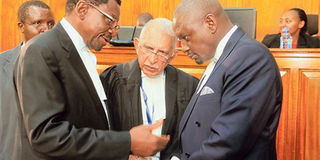How 2013 poll petition cast its shadow on this year’s dispute

Nasa lawyers from left: James Orengo, Pheroze Nowrejee and Otiende Amollo at Supreme Court on August 29, 2017 during the presidential petition. The 2013 petition cast a shadow on this year's dispute. PHOTO | JEFF ANGOTE | NATION MEDIA GROUP
What you need to know:
Delivering the historic ruling nullifying the win of President Uhuru Kenyatta in the August 8 presidential election, Chief Justice David Maraga alluded to the shadow of the 2013 petition still looming large.
Nasa has waged an unrelenting public campaign against the 2013 decision, that ruled irregularities complained against had not “significantly” impacted on the result.
However, Kenyans will have to wait for the full judgements to be compiled before they can know the specific arguments and explanations for Supreme Court’s decision.
The second presidential election challenge in five years thrust the Supreme Court into a Cicero moment, in which a court is pressured to make a decision to “cleanse” itself from public perceptions of partiality arising from past decisions.
Delivering the historic ruling nullifying the win of President Uhuru Kenyatta in the August 8 presidential election, Chief Justice David Maraga alluded to the shadow of the 2013 petition still looming large.
“The 2013 decision was not received very well. The court read the decision without a full judgement. The expectations (in the 2017 petition) were that this morning we should read a full judgement” said the CJ.
He apologised, saying the court would only read the ruling but issue a full explanation later due to time constraints.
PERCEIVED WRONGDOINGS
While filing the petition, Nasa presidential candidate Raila Odinga had himself challenged the Supreme Court to use the petition to correct perceived wrongdoings from the 2013 decision.
“Our decision to go to court constitutes a second chance for the (Supreme) court. The court can use this chance to redeem itself, or compound the problems we face as a country. The manner in which the court handled the 2013 petition is a travesty of justice,” said Mr Odinga.
In essence, the petition framed the burden of expectation upon the shoulders of the Supreme Court, in effect inviting the court to seize the opportunity to make up for perceived shortcomings from the past.
Nasa has waged an unrelenting public campaign against the 2013 decision, that ruled irregularities complained against had not “significantly” impacted on the result.
IMAGE
The high-stakes dispute mirrors a classical courtroom drama in which a prosecutor criticises the court, before telling the judges that the only way to “restore” their tainted image is to convict the accused.
In his opening statements, the prosecutor, named Marcus Tallius Cicero (120-33 BC) , laid out his vicious assault on the court. “What I desire, what I seek above everything else, oh judges, is to bring an end to the discredit and unpopularity to which your image, your names and your decisions have fallen. It appears by divine intervention an opportunity has been thrown your way by this crisis,” he said.
Then he said: “For an opinion has now been formed and become established, pernicious to us, pernicious to the republic, which has become a common talk not only in Rome but also among foreign nations that in the courts of law as they exist at present, no wealthy man, however guilty he may be, can possibly be convicted.”
Cicero tells the court the accused, named Gaius Verres, is the perfect opportunity to fix the image problem he painted above in equally unrelenting brutal advance:
REPUTATION
“Now at this time of grave peril to your reputations and your tribunals, Gaius Verres is brought to trial, a criminal, a man condemned in the opinion of everyone by his life and actions, but acquitted by the enormousness of his wealth according to his own hope and boast,” said Cicero.
The Romans and the world at large would hail the court’s decision, for fixing the nuisance, said Cicero.
“Oh judges, I have undertaken this cause not to increase the discredit of the judges, but to relieve it from the unpopularity which I share with it. By acting justly, you have an opportunity to retrieve the lost credit of your judicial proceedings, regain credit with the Roman people, and give satisfaction to foreign nations,” he said.
He described Verres’s character as embezzler of the public funds, the petty tyrant of Asia and Pamphylia, the man who deprived the city of its rights, the disgrace and ruin of Sicily before aiming the killer punch. Any other decision would be untenable, Cicero concluded.
“And if you come to a decision about this man with severity and a due regard to your oaths, that authority which ought to remain in you will cling to you still. Otherwise, the entire Roman citizenry will know even the court was not beyond the defendant’s reach and compromise,” he said.
VOTING
Overwhelmed, Verres banished himself from Rome, opting for self exile than wait for conclusion to the blistering legal and political onslaught in court.
Although the Supreme Court in Kenya found no fault with the way the voting was conducted, it upheld the complaint of the petitioner that the manner in which the results were transmitted to the national tallying centre was in violation of both constitutional and legal provisions on transmission of presidential vote results.
However, Kenyans will have to wait for the full judgements to be compiled before they can know the specific arguments and explanations for Supreme Court’s decision.




